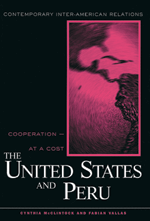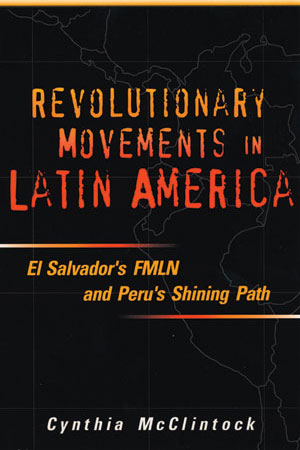
| Featured Publications | |
Books |
|
The United States and Peru: Cooperation- At A Cost (Co-authored with Fabian Vallas, Routledge, 2003) The early 1990s were a critical turning point in the relationship between the United States and Peru, as historically contentious relations dramatically improved. During President Albert Fujimori’s rule, he sought to cooperate with the U.S. government on most issues, including security threats, free-market reform, and narcotics control. Fujimori’s government did not meet international standards for democracy and human rights, but relations with the U.S. were more cooperative than they had been since the beginning of the Cold War. Why did the Clinton administration place a relatively low priority on democracy and human rights in Peru? The United States and Peru traces the changes in the relationship between the two countries from the 1980s through the 1990s, examining economic, political, and military issues. Attention is given to the problems of drug-trafficking, guerrillas, human rights violations, and to the 1995 war between Peru and Ecuador and the U.S. role in the resolution of the conflict. |
|
Revolutionary Movements in Latin America Why were El Salvador's FMLN and Peru's Shining Path able to mount such serious revolutionary challenges in the 1980s and early 1990s? And why were they able to do so despite the fact that their countries' elected governments were widely considered democratic? These two guerrilla groups were very different, but both came close to success. To explain why, the author examines the complex interplay among political and economic factors, the nature of the revolutionary organization, and international actors. McClintock emphasizes that the end of the Cold War does not mean the end of revolutionary groups, and that the United States can play an important role in determining the outcome of future confrontations. The book concludes with practical policy options for the U.S. government as it looks to foster peace and democracy in the western hemisphere. |
|
Peasant Cooperatives and Political Change in Peru. Cynthia McClintock. Princeton: Princeton University Press, 1981 This extensive analysis of political and economic structures developed by the Velasco government concludes that peasant political culture is less impervious to change than is generally thought. Unfortunately, neither Peru nor Velasco benefitted much because "although the Peruvian 'New Man' was a more participatory and trusting individual, the focus of these new attitudes was the self-managed enterprise [the cooperative] itself. Peasants remained rather unconcerned with the fate of other peasants . . . and they also continued to be skeptical of the national government." |
 |
Recent Articles AN UNLIKELY COMEBACK IN PERU Despite Humala's lack of political experience, the credible charges against him of committing human rights violations in 1992, and his complicity in his brother's bloody 2005 attack against a police station, the retired military officer won the election's first round and came close to winning the second. A new law on political parties sought to reduce their prodigious number, requiring parties to win 4 percent of the vote in order to obtain any congressional seats. In a June 2006 poll conducted by the Catholic University's public-opinion institute, 67 percent of Peruvians said that "democracy is preferable to any other form of government"-a large jump from 2005 figures.
CORRELATES OF LEVELS OF DEMOCRACY IN LATIN AMERICA DURING THE 1990S. (With James H. Lebovic) Latin American Politics & Society, Summer 2006, Vol. 48 Issue 2 Does the conventional wisdom about the relationships between economic, cultural and political party variables and democracy stand up in the Latin American experience of the 1990s? This study, utilizing new data sets for the region, finds that some traditional hypotheses are upheld better than others. It sustains the conventional wisdom that economic development, economic growth, democratic values, and (with a two-year lead) education correlate positively with the level of democracy. Surprisingly, however, neither social trust nor the number of political parties is significantly correlated with the level of democracy. The study suggests various possible explanations for the weak or nonexistent relationships for social trust and number of parties, in the hope that these surprising results will stimulate further research.
LIPSET'S LEGACY Journal of Democracy; April 2005, Vol. 16 Issue 2 Reviews the book "The Democratic Century," by Seymour Martin Lipset and Jason M. Lakin.
|
|

